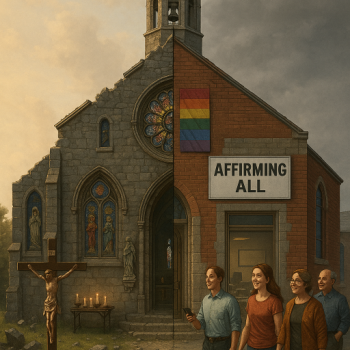As many of my readers know, I tend to write on the topic of Church authority, and specifically sola scriptura. For those not familiar with Latin, sola scriptura translates as: by scripture alone. Simply put, Scripture alone, according to Keith Matthison, means that Scripture is the “sole, final, and infallible norm of faith and practice.” In his book, The Shape of Sola Scriptura, he concludes:
The Church must affirm that Scripture is the sole, final, and infallible norm of faith and practice. And the Church must affirm that Scripture is to be interpreted in and by the communion of saints within the theological context of the rule of faith. Only by rejecting all forms of autonomy, institutional or individual, can any branch of the Church be in obedience to Jesus Christ the Lord. [emphasis added]
Now, the above seems all well and good, as most sincere Christians who accept the authority of the Scriptures believe them infallible (or inerrant). However, how does a Protestant, like Mathison, achieve true reliance on the Scriptures as “the sole, final, and infallible norm of faith and practice” and avoid “all forms of autonomy,” if interpretation itself is involved? How does he avoid interpretive collapse?
Allow me to explain.
What is Interpretive Collapse?
Interpretive collapse occurs when the reader of the text and text itself become indistinguishable from one another. The Protestant claims they interpret Scripture clearly and correctly, even within the “communion of saints” and “the theological context of the rule of faith,” but they fail to acknowledge that clarity (or perspicuity) is an assumption, not a given. Actually, the Protestant merely attempts to understand Scripture and the meaning of the text. Now, this same Protestant may think they subject themselves to God through the Scriptures, however, they only subject themselves to their own interpretation of the Scripture, not God. Therefore, interpretive collapse occurs when interpretation and Scripture become the same thing.
Interpretive Collapse Push Back # 1
Moreover, one common push back against the accusation of interpretive collapse is to reassert perspicuity. The inability to accept perspicuity, they contend, falls squarely on the one who rejects it as some sort of character, intellectual, or spiritual flaw (mostly a spiritual flaw). How else ought one to understand the below words of Matthison?
First, he directly quotes the Westminster Confession of Faith:
The Supreme Judge, by which all controversies of religion are to be determined, and all degrees of councils, opinions of ancient writers, doctrines of men, and private spirits, are to be examined, and in whose sentence we are to rest, can be no other but the Holy Spirit speaking in Scripture. (WCF, I:10—emphasis mine).
He then draws the following conclusion:
What the Assembly is here confessing is something that should be self-evident to any believing Christian. The Holy Spirit, God Himself, is the Supreme Judge. Since the voice of Almighty God—the Word of God—is the ultimate authority, and since Holy Scripture is the inspired (theopneustos) Word of God, Holy Scripture is our ultimate authority. No word of any man or group of men can stand on the same level of authority as the Word of the Living God. [emphasis added]
So, any “believing Christ” should see as “self-evident” that the Holy Scripture is the ultimate authority above “any man” or “group of men” to settle all “controversies.” What of those who do not see this “self-evident” truth?” Do we (as I count myself as one who does not see it) lose our status as “believing Christians” by rejecting the clear teaching of Holy Scripture to settle controversies (perspicuity)? Are we intellectually defective or spiritually compromised? Both? Maybe the devil has blinded us to God’s “self-evident” truth? Regardless, such claims of “self-evidence” and authenticity of Christian faith by the standard of one’s own interpretation of Scripture represents the epitome of interpretive collapse. (One must also ask, if perspicuity is so “self-evident,” why the need for early Church councils in the first place?)
Interpretive Collapse Push Back # 2
The second common push back against the accusation of interpretive collapse is the “we are all in the same boat” appeal. Protestants who support perspicuity often make the claim that Catholics fall victim to the same interpretive issues when they interpret the many documents and teachings of the Catholic Magisterium. In other words, Catholics, like Protestants, possess fallibility, so like Protestants, they fallibly interpret Church documents. However, while true that both lay Catholics and Protestants possess fallibility, the Catholic assents to Church teaching as an act of faith informed by reason. Lay Catholics possess no ability or authority to use the Scriptures to correct Church teaching, none. A Catholic either faithfully assents or unfaithfully dissents to Church teaching.
Interpretive Collapse Push Back # 3
Finally, a third common push back against the accusation of interpretive collapse is the “Catholics disagree as Protestants do, so what use does a living magisterium really provide?” A list of the beliefs dissenting Catholics affirm usually follows this claim. For example, many Catholics use contraception, get abortions, promote same-sex marriage, and some question transubstantiation. Should not an infallible magisterium squash such dissent? Well, the very nature of dissent infers the existence of firmly established beliefs one dissents against.
Conversely, when looking at dissent considering sola scriptura, what exactly does one Protestant dissent from in relation to another Protestant that also affirms sola scriptura? They both claim the same authority (Scripture) and the same Holy Spirit. Catholics can (and do) receive correction, even excommunication. If N.T Wright and James White disagree on St. Paul’s view of justification, where do they turn to settle their “controversies of religion?” They both also claim to read with the church, practice good hermeneutics, and approach the topic in prayer.
Final Thoughts…
For my final thoughts, I want to ask Protestants a few pointed questions.
- Does the need for early Church councils count for or against perspicuity?
- I do not hold to the perspicuity of Scripture. Am I intellectually defective or spiritually compromised? Do you consider me willfully deceived by the devil?
- How do you know you are obeying God and not merely your interpretation of the Scripture?
I stand by to discuss these questions, or any of the above points, with any Protestant who affirms sola scriptura in any format they wish. God bless.
Recommendation
Much of the insights above were inspired by Casey Chalk’s masterful book, The Obscurity of Scripture: Disputing Sola Scriptura and the Protestant Notion of Biblical Perspicuity. Mr. Chalk stands at the forefront of a new and fresh way to address issues related to both ecclesial and scriptural authority.
Thank you!
Read The Latin Right’s other writing here.
Please visit my Facebook page and IM your questions (and follow my page) or topics for articles you would like covered.
Also, please subscribe my YouTube page for updates on upcoming articles.













